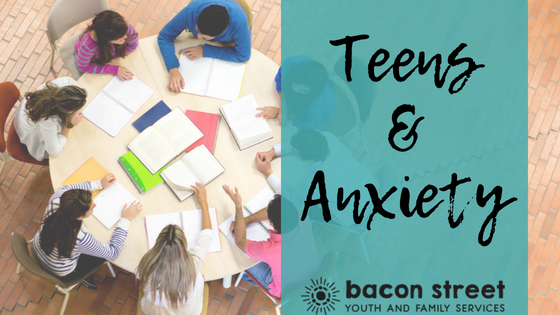
Approximately 25% of 13- to 18-year-olds have an anxiety disorder.
Just under 6% have a severe anxiety disorder.
Anxiety. Sometimes I feel like this word gets thrown around quite a bit because it is so misunderstood. But anxiety is actually a normal reaction to stress. Sometimes, it helps people deal with tense or overwhelming situations. Going on a date, performing in front of a crowd, final exams, etc. can cause anxiety. The kind of anxiety where your heart feels like it’s pounding out of your chest and your stomach is in your throat. But really, it’s totally normal. That is how your body responds to those anxious feelings.
So when should parents worry about anxiety in their teen? When it starts to go beyond the symptoms listed above and negatively impacts everyday life. Perhaps there is a change in relationships with friends or family, extracurricular activities, or schoolwork. If this is the case, it may be an anxiety disorder.
So that seems pretty straight forward right? Not really. Teens can be hard to read. How do you know if they are just experiencing the normal changes a teenager goes through? Or when it is something more serious? There are some hidden signs you can watch for, courtesy of psycom.net…
Emotional changes:
- Feeling “keyed up”
- Feeling on edge
- Irritability
- Difficulty concentrating
- Restlessness
- Unexplained outbursts
Social changes:
- Avoiding social interactions with usual friends
- Avoiding extracurricular activities
- Isolating from peer group
- Spending increased time alone
Physical changes:
- Frequent headaches, including migraines
- Gastrointestinal problems
- Unexplained aches and pains
- Excessive fatigue
- Complaints of not feeling well with no obvious medical cause
- Changes in eating habits
Sleep disturbance:
- Difficulty falling asleep
- Difficulty staying asleep
- Frequent nightmares
- Not feeling refreshed after sleep
Poor school performance:
- Significant jump in grades (usually downward)
- Frequent missed assignments
- Describes feeling overwhelmed by workload
- Procrastinates on, or has difficulty concentrating on, homework assignments more than usual
The important thing to remember is PATTERNS. That is where you can tell if these symptoms are a teenager just being a teenager, or a sign of something else. If their pattern of behavior changes, you may want to take action.
A lot of people associate panic attacks with anxiety, but not everyone who has an anxiety disorder will experience panic attacks. Or they are more mild than others. Here are some symptoms that are common among people with anxiety disorders:
- Rapid heartbeat
- Sweating and trembling
- Dizziness
- Upset stomach
- Difficulty breathing
- Chest pain
- Feeling like they’re dying
- Feeling like they’re “going crazy”
- Numbness or tingling in arms and legs
- Derealization
Which brings us to this: If you suspect that your teen may have an anxiety disorder, how can you help them?
- Practice mindfulness. Mindfulness teaches you to stay in the moment. The moment your mind starts to wander, it starts to worry about things in the past or future. Train your brain to stop worrying about things it doesn’t need to. Focus on your breathing. And if your mind starts to wander, bring focus back to your breathing. There are several apps that can guide you through practicing mindfulness.
- Exercise! It increases the level of GABA in your brain (the calm down chemical). When the GABA level is at its normal level in the brain, anxiety symptoms tend to disappear.
- Food! The healthier your gut, the healthier your mental health. Not that you can’t have some unhealthy food here and there, just don’t overdo it.
- Love yourself a little louder. I love this idea, courtesy of heysigmund.com. Anxiety makes you dwell on all the negatives. But everyone has their strengths and awesome abilities they need to remember. And if your teen is having a hard time remembering this, remind them. Let them hear it from their parents and other family members too!
- Always remember…if this feels like something you can’t cope with on your own…get help! There is no shame in asking for help. It means you are strong enough to recognize there is a problem and you want to fix it.
Thanks for reading, and see you next week!
Hope